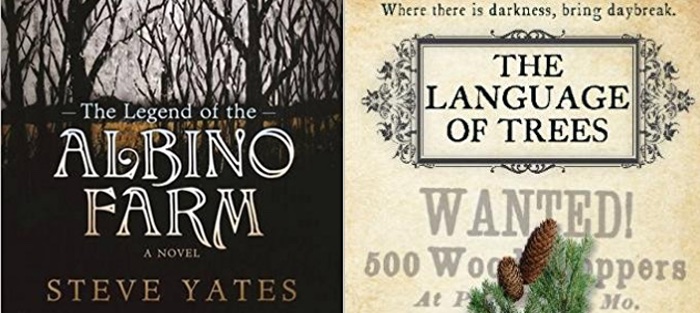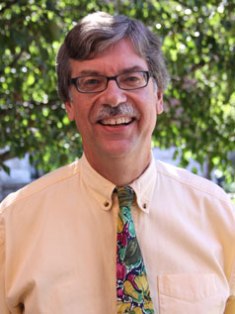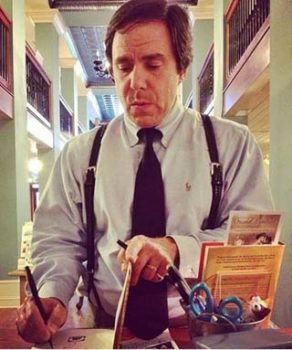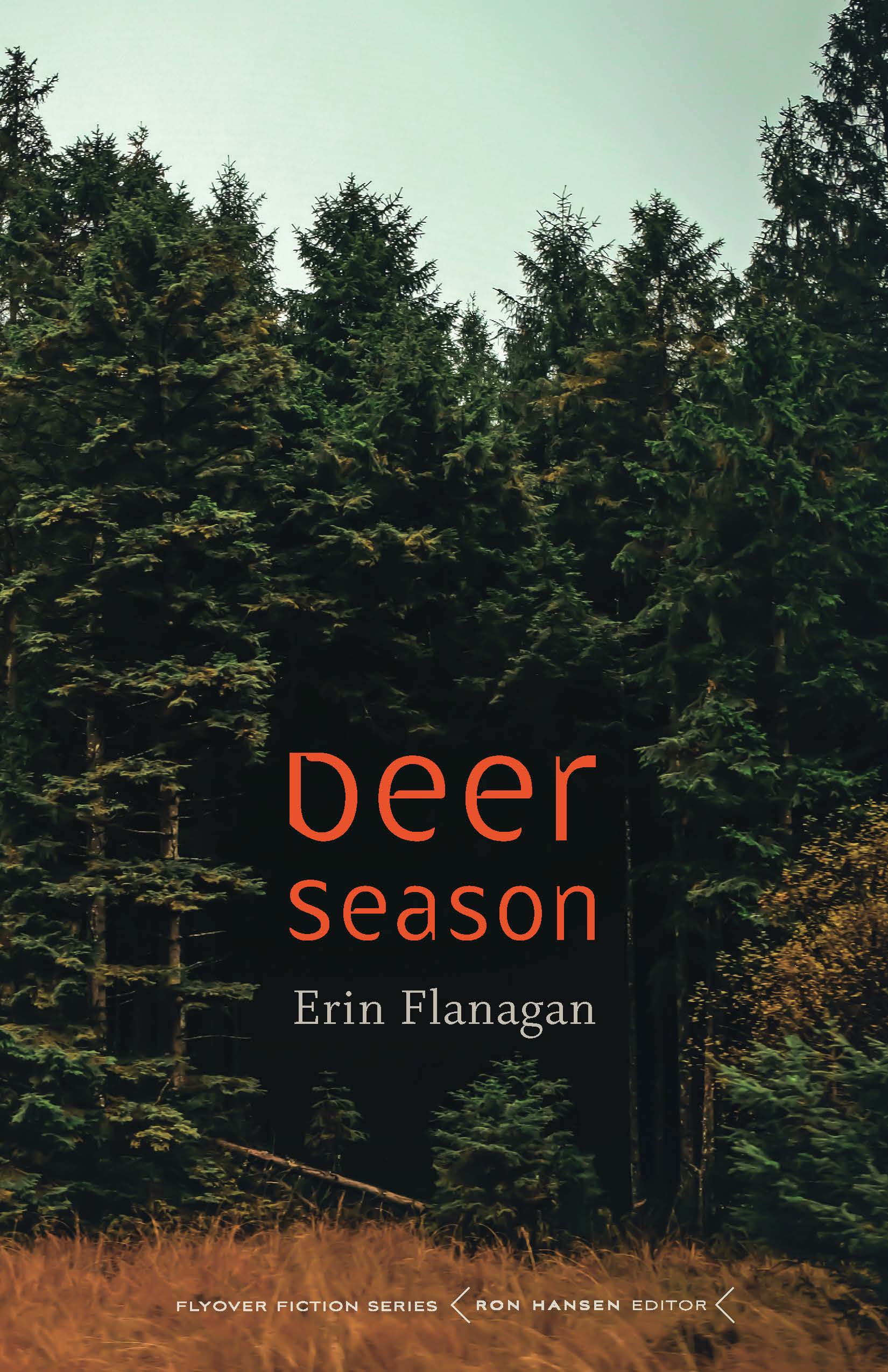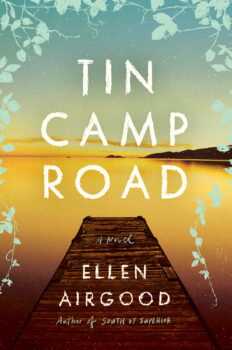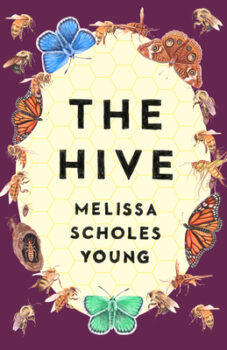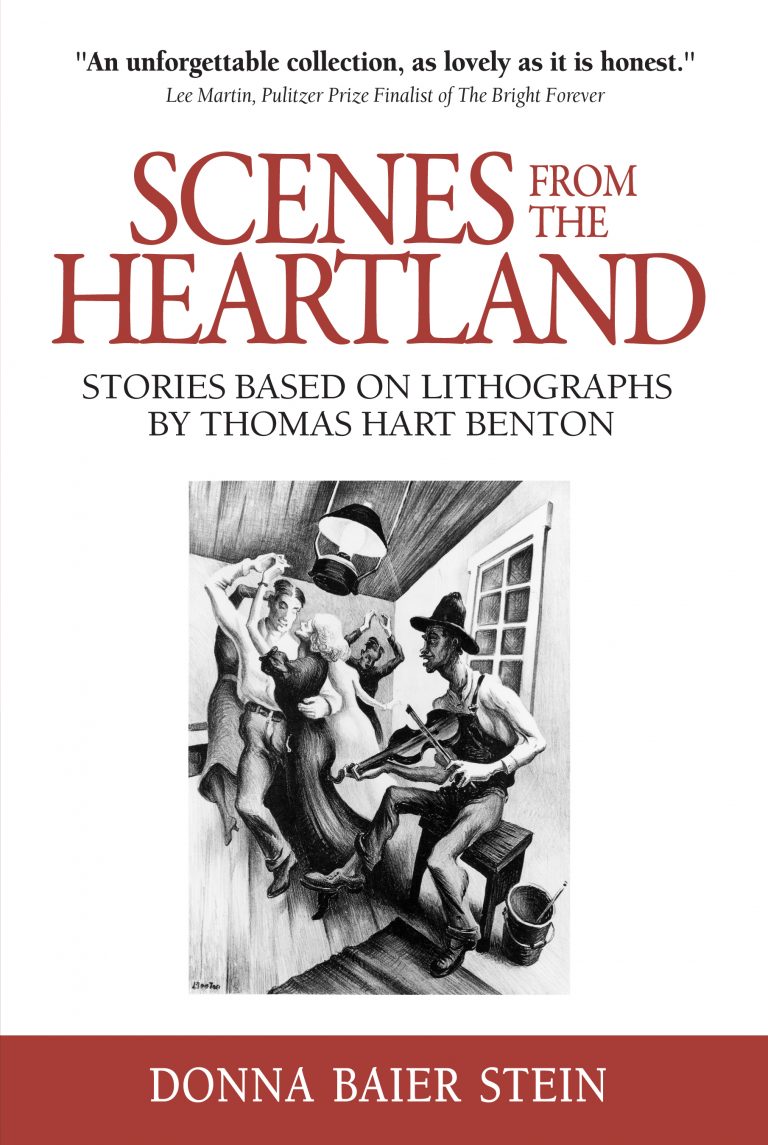Steve Yates and Steve Wiegenstein share more than a common first name. Both are novelists and short story writers who grew up in the Missouri Ozarks, both have won awards for their work, and both seek to connect history with the present day in their fictions.
Yates, a native of Springfield, wrote about Ozarks history during and after the Civil War in his novels Morkan’s Quarry (Moon City Press, 2010) and The Teeth of the Souls (Moon City Press, 2015), and explores contemporary settings in Some Kinds of Love: Stories (University of Massachusetts Press, 2013), Sandy and Wayne: A Novella (Dock Street Press, 2016), and The Legend of the Albino Farm (Unbridled Books, 2017). Wiegenstein, a native of the Eastern Ozarks, drew on his scholarly work to create a fictional utopian community in his novels Slant of Light (Blank Slate Press, 2012), This Old World (Blank Slate Press, 2014), and The Language of Trees (Blank Slate Press, 2017).
The two have appeared on panels together at festivals and can often be found together at conferences and symposia, although Yates now lives in Mississippi and Wiegenstein is on the Ozarks’ edge in Columbia, Missouri. They shared their thoughts on writing, their unique landscape and background, and their place in the literary world.
Interview:
Steve Wiegenstein: Steve, let me begin by saying what a pleasure it is to be talking with a writer whose work I admire, and have admired for a long time. Not that we’re that old! I suppose we could start by addressing a common issue: being an “Ozarks writer.” That’s a designation that comes with baggage for some people. How do you see that term? Do you consider yourself an Ozarks writer, and if so, what does it mean to you?
Steve Yates: Not much baggage, I reckon, really. Nothing like the burden of a Mississippi writer of Eudora Welty’s day trying to write in the shadow of a mountain named William Faulkner. When I consider the landscape of Ozarks writers—I am one, as you are inescapably—I see two splendid peaks. The Taum Sauk of Daniel Woodrell and the muscular, tattooed grit of his West Table. Then the Mount Magazine of the magical Donald Harington and his everlasting Stay More. Both mountains, for sure, but the ecosystem and biodiversity between them! We have a thousand miles of elbow room.
I mean, surely you feel this freedom, Steve? It’s remarkable the bravery of what you’ve achieved in the three Daybreak novels. You placed something in our hills that’s never been there before, a Utopian Community, and you did so with otherwise pinpoint historical accuracy to everything else around it and all the equipment inside it. Like Harington, high wire without the net!
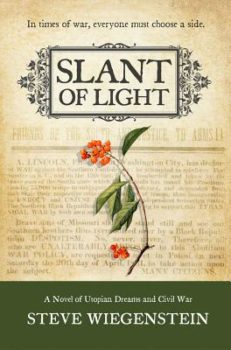 I must admit, at first I resisted the designation of “Ozarks writer” the same way I resisted “historical novelist”—because I thought it would be limiting. After Slant of Light came out, for a while I called it “a mainstream novel that happens to be set in the past,” an awkward circumlocution if ever there was one. But I had a moment of insight at some point in which I realized that there’s nothing limiting or lesser about having the Ozarks as my setting and subject matter. It’s all in the treatment. Everybody has a setting, and if people think that setting a novel in the Ozarks means it has to be populated with pop-culture stereotypes, that’s their problem, not mine. And of course, one of those prevalent pop-culture stereotypes is . . .
I must admit, at first I resisted the designation of “Ozarks writer” the same way I resisted “historical novelist”—because I thought it would be limiting. After Slant of Light came out, for a while I called it “a mainstream novel that happens to be set in the past,” an awkward circumlocution if ever there was one. But I had a moment of insight at some point in which I realized that there’s nothing limiting or lesser about having the Ozarks as my setting and subject matter. It’s all in the treatment. Everybody has a setting, and if people think that setting a novel in the Ozarks means it has to be populated with pop-culture stereotypes, that’s their problem, not mine. And of course, one of those prevalent pop-culture stereotypes is . . .
Crime. That’s a tendency in Ozarks fiction that might could stifle things. It’s hard enough already writing from the Balkans of America, the flyover’s flyover. But it seems hardboiled crime provides the only path to get New York and Los Angeles to take any note of an Ozarks story. The Ozarks is not in fact a festering den of ceaseless clan feuds, banditry, and drug-fueled vendettas. Daniel Woodrell has firmly told the world that in countless interviews. We are not Montenegro circa 1760. Do you feel that pressure, Steve? Write this, but with double-wides and double-barrels. Don’t you dare write stuff where people of middle class means, sound minds, and modest intentions lose it all by falling in love! Even if you were the John Cheever of the Ozarks, would you find a major publisher right now writing outside of the noir vogue?
Unfortunately, not likely. Some terrific writing is happening these days about rural places in general, not just the Ozarks, but finding it takes some hunting. For some reason, the nonfiction market for explorations of country life seems more robust to me than the fiction market. I’ll be an armchair analyst here and say that maybe the reason for this is that publishers are more comfortable with rural people as objects of study and analysis than as complete and interesting human beings.
Right, the real hillbilly elegy, show run by Myopic Manhattan. Yet when it comes to fiction as a niche literary product, here we get this genre strait-jacket: there better be a dead body by page one and meth-ridden rustics by scene two.
Now, hold on. A writer can do remarkable things with genre or near-genre fiction. Long ago I wrote my doctoral dissertation on contemporary writers’ deployment of the structures of genre fiction in service of their own ends. So I don’t automatically look down upon the hardboiled noir as a strategy. Look at Winter’s Bone. Structurally, it has a lot in common with the hillbilly gothics we know and detest; it’s the linguistic inventiveness and character development that sets it apart. By the way, I love the idea of the Ozarks as the Balkans of America! It fits so well. Poor, mountainous, colonized, ill-understood—that’s us, all right. I read a pithy comment by Wendell Berry recently:
Rural America is a colony, and its economy is a colonial economy. The business of America has been largely and without apology the plundering of rural America, from which everything of value—minerals, timber, farm animals, farm crops, and ‘labor’—has been taken at the lowest possible price.
I think if people want to understand the alienation of rural life, that’s a good place to start.
My God, that’s spot on. Gobble the lead and zinc, and then get me back to the Hamptons.
But to return to the subject of Ozarkers and stereotypes for a moment, I want to ask you about The Legend of the Albino Farm. Reading that book, I didn’t feel that the novel was setting out to be a “corrective,” or whatever one might call it, to Ozark stereotypes in a deliberate way. But by choosing a classic horror/ghost story as the matrix in which the story takes places, it confronts those stereotypes more as a matter of necessity. Not an agenda-bound book, but a book in which this agenda inexorably arises, so to speak. Am I off base in this thought?
With one character I thought along those corrective lines exactly—that lawyer for the Sheehy family, Mr. Houston, pronounced like the street in Soho rather than the city in Texas. I grew up in my father’s law firm, working there from age ten until sixteen and even after. All his law partners were inextricably in my life, like a raucous set of brilliant, combative uncles. I wanted Houston to be like my father’s law partners, polished, learned, joyful in their trade, equally masterful in using language as sword or salve. I wanted to show that presence in the Ozarks, that sparkling mind, that diamond in a ditch.
You have several diamonds in the ditch. I mean, let’s talk heroines. And how delicious that one great heroine gets to counsel another in Charlotte Turner soothing and guiding Josephine Mercadier! Viridis and Rindy and Latha and Sonora, your heroines have that Harington seductive wholeness!
Not gonna lie, I am in love with Charlotte Turner despite the hell I put her through for three books and the fact that she’s a fictional character. From an intellectual standpoint, I understand the appeal of anti-realistic techniques and distancing devices that call our attention to the artifice of novel-making. But there’s something immensely satisfying about the realistic creation of character, and I believe we both have the sense that plenty of original characters are out there to be created. I appreciate the comparison with Harington, but to be honest about it, I think you are closer to him stylistically. You both have that same intoxication with language, those surprising turns that come halfway through a sentence.
That’s too big a compliment for me to take, Steve. Just so you’ll know . . . when I was first under the crushing workload of being a publicist at a university press, back in Arkansas, Donald Harington’s encouragement, constantly via email, kept me alive as a writer. Without him . . . really, no way would I ever have published five works of fiction in the last seven years. The workload, I promise, has only increased. I owe him all I will ever write.
But look, from whose still do you draw your shine? What writers do you read to clean the pipes and reorient your compass?
I suspect that I am like most writers in that my reading is happenstance and chaotic. I do love to read Wendell Berry, and in terms of Ozark writers, I’d like to call out a writer I think is underappreciated. That’s C. D. Albin, whose collection of short stories Hard Toward Home is just beautiful. Talk about resisting stereotypes! The characters in those stories are so complicated and so true to the Ozarkers of my experience, and there’s not a toothless rifle-toter among them. There are rifles, to be sure, but they are handled in the way country people handle them, as dangerous tools worthy of caution.
How about you? Where does your reading take you?
C.D. is dandy. And Donald (Skip) Hays from Fort Smith. The Dixie Association and Dying Light. Wonderful stuff. But reading, I return again and again to Anton Chekhov and the Austro-Hungarian writer Joseph Roth. Roth especially in The Radetzky March or Stationmaster Fallmerayer or The Tale of the 1002nd Night. He writes of a lost world, a lost way of life. Every sentence contains a palpable, sometimes excruciating longing.
We should talk about working and what that does to a writer. Or for a writer, I guess? The two of us, we don’t teach in a creative writing program. We don’t go to AWP. I told someone recently even if Sewanee would accept me, I would lose my job. I couldn’t take off that much work to engage all that splendor and fellowship. Are there advantages to working in an office?
Your mention of Roth reminded me of another author I return to again and again, W.G. Sebald. There’s something hypnotic in the way that man builds a narrative that I can’t resist. But back to the question of working outside academe. As a master’s graduate from a creative writing program, like yourself, I can’t engage in the creative-writing-degree-bashing that we sometimes see in the journals, because my time in that program taught me a lot.
Right on. I will not countenance that perennial hogwash that writing programs are damaging and limiting or that writers can’t be taught. They can be taught. I sure as Hell was.
But my view of what it has taught me has changed a great deal. I learned about craft, polish, and technique, all of which are wonderful and necessary. But I gained no sense of subject or audience. That’s obtained through reading widely, thinking much, and experiencing life to the greatest extent possible. I would worry that if I was housed in a creative writing program, I might think too much about craft and polish, and not enough about the subject to which that craft is applied. And work, of any sort, is one of the ways to experience life. So I don’t begrudge myself the need to work. How about you?
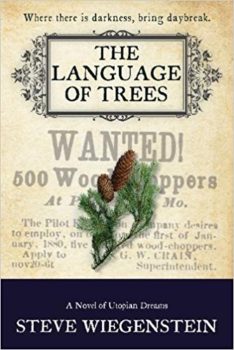 I rejoice that I have access to so much material about the way American commerce happens. Airplanes (even prop planes), rental cars, Hampton Inns (or worse), Amtrak trains, New Jersey transit, subways, gift shows, actual retailing, sales calls, webinars, board meetings, reductions in force, professional improvement plans, video conferences, delusions of synergy, madness of management, outside-the-box boondoggles, “Margin up, Punk,” you know? Office hijinks. When I try to read fiction in which the main character is a writer or worse a writing teacher . . . I can’t even finish the first page. That’s the bubble of all bubbles.
I rejoice that I have access to so much material about the way American commerce happens. Airplanes (even prop planes), rental cars, Hampton Inns (or worse), Amtrak trains, New Jersey transit, subways, gift shows, actual retailing, sales calls, webinars, board meetings, reductions in force, professional improvement plans, video conferences, delusions of synergy, madness of management, outside-the-box boondoggles, “Margin up, Punk,” you know? Office hijinks. When I try to read fiction in which the main character is a writer or worse a writing teacher . . . I can’t even finish the first page. That’s the bubble of all bubbles.
It occurs to me . . . neither of us has to write to advance in our jobs. Right? You’re not tenure track faculty. So why do you do it? What’s in it for you?
In dark times, after a fifty-hour week at University Press of Mississippi in which there were also my own book signings or readings or interviews or deadlines to meet . . . I have sure asked myself that question in the mirror at 3:30 a.m. I think of what Allan Gurganus said to us at Arkansas . . . “You love literature so much that you would take all the time and care to give some back.” There is so much published that is all the same. Yet there burns that desire to create something that does not exist. Especially for the Ozarks. Something that is not exactly like anything else under the sun. Like all the crime, huh? Or angry but lyrical rustics in Ford trucks.
I know! Or disaffected suburbanites. Heaven spare us from writing about that.
Doh! That’s what I’m headed for next! Only it’s really a novel about an obsessive love triangle, the impossibility of making it big in music if you come from Springfield, opioid addiction, and, naturally, pond management. The Lakes of Southern Hollow. Southern Hollow is that subdivision that shows up in a lot in my short stories, even in The Legend of the Albino Farm. That wonderfully crass girl who hates the chili and feels the Albino farm story is baloney worth, oh, a handjob, she’s from Southern Hollow.
That’s what I like about your work! I never know where you’re going to take us next. I will bet my next paycheck that the disaffected suburbanites you give us will be unlike any others I have read.
Well what will you write next? Continue or break free of Daybreak?
I’m sticking with Daybreak. My idea is to continue the cycle of novels through the present day, so that as a group they create a coherent portrait of a small Ozarks community as it prospers, suffers, and endures through history. The next one, title TBD, takes place shortly after the turn of the 20th century. That moment is important to me not because of the round-numbered date, but for two reasons. First, the arrival of the word “hillbilly” into the American lexicon, and the subsequent formation of that dual stereotype of the hillbilly as rustic individualist and violent degenerate. Second, the St. Louis World’s Fair, that grand gesture designed to display American technological and racial superiority. Combine the two and there are some interesting themes to explore.
Holy cow! High wire without a net. Four, five Daybreak novels? Wow! You know . . . I bet some stuffed-shirt editor told Pat Barker she could never sustain three, four novels about World War I and a gay British soldier and a psychologist. She showed him. You’ll show us!
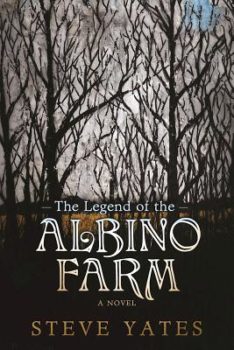 Hah! Speaking of sustained themes, I’d like to ask you about a grand one. In our work, both of us deal with people who integrate universal structures into their lives. In your case, it’s Catholicism, which runs through all the way from Morkan’s Quarry to The Legend of the Albino Farm. In mine, it’s the utopian ideal, which is the founding principle of the Daybreak community. Could you help me understand how you see that imperative at play in your work?
Hah! Speaking of sustained themes, I’d like to ask you about a grand one. In our work, both of us deal with people who integrate universal structures into their lives. In your case, it’s Catholicism, which runs through all the way from Morkan’s Quarry to The Legend of the Albino Farm. In mine, it’s the utopian ideal, which is the founding principle of the Daybreak community. Could you help me understand how you see that imperative at play in your work?
Unless you are Andre Dubus, the original, and you’re wielding some tenet of Catholicism as the moral crucible of your tale—which I don’t have the brains or soul to do—I think Catholicism can be a kind of dominant, universal overlay, like nitrogen in ambient air. We breathe it. We can fool ourselves that we don’t need it, and yet it turns the whole God-struck sky blue. In The Legend of the Albino Farm, I felt really comfortable in that Catholicism was integral to who the Sheehys and the Ormonds and Wes Connelly are, a vital but autonomic part, like breathing.
With Utopianism, though, I feel as if in many ways you are doing something extraordinary that I just don’t know how to do. To use that high intellectual stricture as kind of a wall of impossibility when you smash it up against Ozarks reality and those characters’ lives. I mean, that often gives Daybreak its urgency. That’s the stakes, right? The universe verges on crumbling! How do you do that?
For me, 19th-century utopianism is a distillation of the kind of Enlightenment-era optimism that led to the founding of the country, and that persists to this day in our imagination. It’s a view of human nature and possibility, and although people like to talk about the inevitable failures of utopias, I prefer to think about the kind of person who embraces a utopia. There’s an insane level of bravery in that act, bravery that takes place not in a single moment, but over a lifetime. So writing about a utopian community is writing about people who leap to enact impossible beliefs, something we can admire even as we shake our heads.
Well, I can’t wait to read the next one. Thanks for talking with me about all this. It’s been a real treat. Let’s get back to writing the Ozarks.

